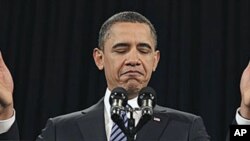In a speech to the U.S. Chamber of Commerce on Monday, President Barack Obama urged the nation's business community to "get off the sidelines" and fully engage with him to help create jobs. The president challenged business leaders to work with the government to get the country through tough economic times.
It was a short walk across Lafayette Park in front of the White House to the Chamber of Commerce for remarks that were part of Obama's fence-mending with leaders of American business.
It was his first address to an organization representing some 3 million companies and a major force in Washington politics, with a powerful lobbying operation on Capitol Hill.
Watch Mil Arcega's Companion TV Report:
The president has had a rocky relationship with the U.S. business community, with Obama being labeled - he says unfairly and inaccurately - as anti-business during the first two years of his administration.
Tensions were seen before last year's midterm congressional elections as the administration and the chamber traded charges over the issue of campaign contributions. Obama also faced opposition from the business community to his sweeping health care reform law and financial system reform.
After joking that he came in the interest of being "more neighborly," and saying he recognized there had been disagreements on key issues, the president urged business leaders to "get off the sidelines" and invest in America's future.
"Now is the time to invest in America," said Obama. "Today, American companies have nearly $2 trillion sitting on their balance sheets and I know that many of you have told me that you are waiting for demand to rise before you get off the sidelines and expand, and that with millions of Americans out of work, demand has risen more slowly than any of us would like. We are in this together."
As in his State of the Union Address, Obama spoke about "winning the future" by making the United States more competitive. He also pointed to export deals with China and India, and a free trade agreement with South Korea that he said will be the model for similar accords the administration is pursuing with Panama and Colombia.
The president said he is confident that the federal government and business can work together to boost the economy, mentioning administration efforts to eliminate burdensome regulations.
But he said that although he understands the pressures businesses face to cut costs and serve shareholders they also have a responsibility to help middle class Americans - too many of whom, he said, have been "left in the mud."
"We cannot go back to the kind of economy and culture that we saw in the years leading up to the recession, where growth and gains in productivity just didn't translate into rising incomes and opportunity for the middle class. That's not something necessarily that we can legislate, but it is something that all of us have to take responsibility for thinking about."
The president received a tepid reaction from those in the audience to some of his remarks, especially those about regulation and export promotion. White House Press Secretary Robert Gibbs said the president was not seeking applause, but that he sought to encourage a process of cooperation.
"I think the president is clear that we are not going to agree on everything, and we have seen some of that transpire over the past two years," said Gibbs. "But as the president has said, we're not looking to refight the battles of the last two years. We've got significant challenges that continue to lay ahead of us, and the only way we are going to make progress is to tackle those challenges together."
Part of President Obama's signals to the business community that he is seeking a better relationship with corporate America has been appointments he has made, including his new White House Chief of Staff William Daley, who has strong business ties.
Obama also has named the chairman and chief executive of General Electric to a new commission to give the president advice on job creation and making the Untied States more competitive.
Reacting to Obama's remarks to the Chamber of Commerce, the Speaker of the House of Representatives, Ohio Republican John Boehner, said the president has created new barriers to job creation and has pursued policies that erode confidence, foster uncertainty and "crowd out private investment.















